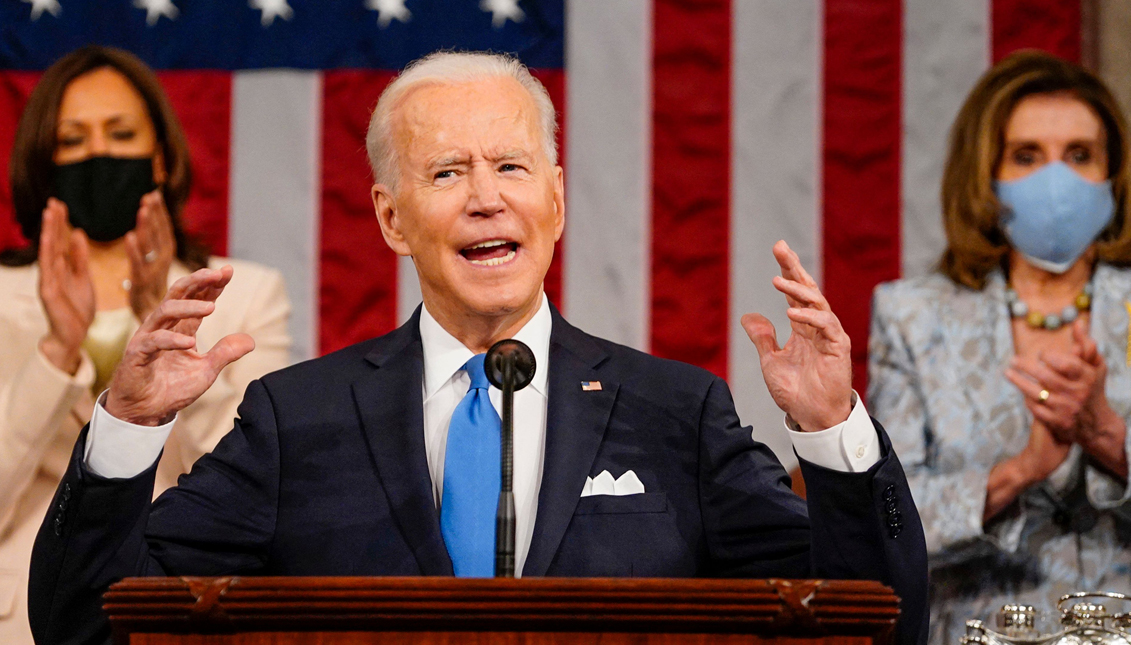
Biden includes solutions to the immigration issue in his first address to Congress
Hoping to make good on his campaign promises, President Biden outlined what he wants to do with regard to immigration.
Towards the end of his address to a joint session of Congress on Wednesday night, April 28, President Joe Biden took a moment to express why he believes legislators need to help him deliver on immigration reform.
A Vox and Data for Progress (DFP) poll conducted between Jan. 29 and Feb. 1 suggests that 69% of likely voters support undocumented immigrants being able to obtain citizenship.
The support rises to 72% when the poll specifically talked about DREAMers, people brought to the U.S. as children.
In a Senate where Democrats have the majority only because of the vice president serving as a tie breaking vote, Biden needs 60 senators to vote in favor of any of the immigration bills currently in Congress.
After the previous Republican administration separated asylum seeking families, began the construction of a southern border wall and tried to end the DACA program, there are less members of the GOP who publicly back reform.
This is why the 46th president needed to make the case for changing the system in his address.
“Let’s end our exhausted war over immigration. For more than 30 years politicians have talked about immigration reform and we’ve done nothing about it. It’s time to fix it,” he said.
Except for the four years of the Trump administration, Biden is partially responsible for a lack of action on this policy matter and in some cases added to the problem.
When he represented Delaware in the Senate, he voted for the Homeland Security Act of 2002, which led to the creation of Immigration and Customs Enforcement (ICE), and the 2006 Secure Fence Act, which authorized 700 miles of fencing along the U.S.-Mexico border.
As vice president, he was part of a White House that deported more than 3 million people and it was more than any presidential administration in American history.
In 2009, once Barack Obama was sworn in, he could have immediately proposed immigration reform since Democrats controlled both chambers of Congress, but their Senate majority was much larger than the one Biden has now.
On Jan. 20, 2009, he had 55 senators and two independents who caucused with the Democrats. By the end of the 111th Congress, Democrats held 58% of the voting share in the upper chamber.
At that time more Republicans could have been moved on the issue, especially since Obama’s predecessor, George W. Bush, heavily pushed an immigration reform bill in 2007 that provided a pathway to citizenship.
Biden highlighted pieces within one of the first bills he sent to Congress as president, the U.S. Citizenship Act of 2021. He stressed that Americans do not have to live under a false dichotomy between showing compassion towards immigrants and enforcing border protections.
“If you believe we need to secure the border, pass it because it has a lot of money for high tech border security. If you believe in a pathway to citizenship, pass it,” he said.
Sen. Ted Cruz from Texas, a border state, was caught dozing off while the president urged his colleagues to pass his bills.
President Biden then talked about his experience in tackling the root causes of migration from Central America when he was in the Obama administration.
As vice president, he helped secure $750 million in assistance for the Northern Triangle in 2016. This was a 34% increase from the previous fiscal year.
He blames Trump cutting aid to the region in 2019 over the migrant caravan crisis for exacerbating the problem, but some are not content with Biden’s new assistance proposal.
The coordinator of Latin American studies at Salem State University and daughter of philosopher Noam Chomsky, Aviva, has been critical of Biden’s efforts to stabilize the region and believes that the proposed aid will serve to benefit large corporations more.
“The model Washington continues to promote is based on the idea that, if Central American governments can woo foreign investors with improved infrastructure, tax breaks, and weak environmental and labor laws, the ‘free market’ will deliver the investment, jobs, and economic growth that (in theory) will keep people from wanting to migrate in the first place,” she wrote.
RELATED CONTENT
Chomsky referenced Central American revolutions during the 1980s to claim that foreign investors exploiting the region’s fertile lands, natural resources, and cheap labor leads to conflict which prompts mass migration heading north.
When the U.S. established Temporary Protected Status (TPS) over 30 years ago, it set out to give the nationals of countries affected by armed conflict or natural disasters a temporary status in America.
Over time several Latin American countries have been given TPS designation.
Chomsky explained how large foreign corporations continuing to take advantage of Central America’s resources could lead to more people from the region seeking TPS because of natural disasters.
“Such operations, in turn, have brought deforestation to the countryside, while their cheap exports to the United States and elsewhere have helped foster the high-consumption lifestyles that have only accelerated climate change — bringing ever fiercer weather, including the rising sea levels, more intense storms, droughts, and floods that have further undermined the livelihoods of the Central American poor,” she detailed.
Biden also mentioned in his speech that vice president Kamala Harris will lead diplomatic efforts to address the principal factors that are driving migration from the region.
She spoke with the President of Guatemala virtually this week and will do the same with President Andrés Manuel López Obrador on May 7, a month after their last exchange.
Harris has yet to visit the border as vice president but she told CNN that she will travel to Central America for the first time in June.
Nearing the end of the section of his speech dealing with immigration the president urged Congress to at least pass what they “all agree on,” permanent residency for undocumented farm workers and recipients of DACA or TPS.
The 2021 Farm Workforce Modernization Act, which would allow undocumented farmworkers to apply for a green card, passed the House in March with 30 republicans joining to vote in favor of it. The bill is currently awaiting a vote in the Senate.
Biden made no mention of the Citizenship for Essential Workers Act, which aims to give legal status to millions who served as frontline workers during the COVID-19 pandemic.
Immigrant advocacy groups and members of Congressional Hispanic Caucus were hoping that that the act would be pushed through the budget reconciliation process so that it would only require 50 votes to pass and therefore avoid a Republican filibuster.
The current administration should have the goal of getting any type of reform passed in the next 18 months because the Democratic party has a chance of not maintaining legislative control after the 2022 midterms.











LEAVE A COMMENT:
Join the discussion! Leave a comment.